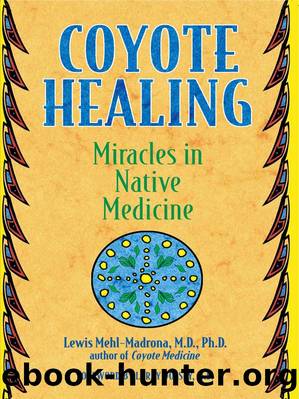Coyote Healing by Lewis Mehl-Madrona

Author:Lewis Mehl-Madrona [Mehl-Madrona, Lewis]
Language: eng
Format: epub
ISBN: 9781591438762
Publisher: Inner Traditions/Bear & Company
Published: 2003-01-15T00:00:00+00:00
5
The East: Discovering Spirit
All of us possess in our DNA cellular memory of a past in which shamans attended to the souls of the afflicted. Our ancestral past sings to us from the music of the codons that form our genetic messages. The ancient shamans live within the history unraveled by decoding the messages of those DNA base pairs. However unconsciously, we carry the healing wisdom of our ancestors within our molecular makeup.
Native healers believe that healing must begin with the spirit and its permission, even if the treatments are radiation therapy or surgery. Healing the spirit is necessary to heal the body, which is why the journey starts in the East.
The idea that our spiritual faith helps us recover from illness is as old as the human race, yet itâs still current news. A 1996 USA Today poll showed that 56 percent of Americans believe that their religious faith helped them recover from injury, illness, or disease.1 More than half of patients undergoing long-term kidney dialysis reported that their religious beliefs played an important role in their ability to cope.2 Three years later these same patients saw their religious beliefs as being crucial to their survival.3 These same studies showed that loss of interest, feelings of worthlessness, social withdrawal, and lack of hope are particularly infrequent among those with strong religious coping strategies. These scientific findings represent what Native healers knew without the need for research: The journey begins with spirit, and the first miracle is the miracle of hope, purpose, and meaning. Spirit feeds these three healing aids.
Unlike academic medicine, the majority of Americans are quite religious. More than half of geriatric patients admitted to the cardiology or neurology departments of Duke University Medical Center attended religious services at least once per week. Fifty-eight percent prayed or studied the Bible daily. More than 85 percent held specific religious beliefs, and more than 40 percent spontaneously told interviewers that their religious faith was the single most important factor that enabled them to cope with life.4 Regular religious attendance was associated with less severe illness and less depression. More important, people werenât staying away from hospital services because of illness or depression. This tells us that patients know more than doctors in the area of faith; patients know how much they need spirit.
Unfortunately, mainstream medicineâs authoritative voice remains skeptical or indifferent to the power of spirit. Faith, religion, and prayer are rarely studied. A systematic analysis of more than four million published scientific studies from 1980 to 1996 showed that only 364 included spiritual or religious factors in their research plan.5 Only 45 of the 364 explicitly mentioned a religious professional, and only 8 described collaboration between medical practitioners and members of the faith community. Eight studies out of four million are not very many! Primary-care researchers are equally uninterested. Among 1,086 studies from the Journal of Family Practice in the years 1976 to 1986, only 21 measured a religious factor.6 During five recent years, only 2.5 percent of published
Download
This site does not store any files on its server. We only index and link to content provided by other sites. Please contact the content providers to delete copyright contents if any and email us, we'll remove relevant links or contents immediately.
Spare by Prince Harry The Duke of Sussex(5195)
Navigation and Map Reading by K Andrew(5156)
Tuesdays with Morrie by Mitch Albom(4784)
Machine Learning at Scale with H2O by Gregory Keys | David Whiting(4312)
Cracking the GRE Premium Edition with 6 Practice Tests, 2015 (Graduate School Test Preparation) by Princeton Review(4291)
Never by Ken Follett(3954)
Goodbye Paradise(3809)
What It Really Takes to Get Into Ivy League and Other Highly Selective Colleges by Hughes Chuck(3760)
Fairy Tale by Stephen King(3394)
Harry Potter and the Prisoner of Azkaban (Book 3) by J. K. Rowling(3359)
Pledged by Alexandra Robbins(3177)
Kick Ass in College: Highest Rated "How to Study in College" Book | 77 Ninja Study Skills Tips and Career Strategies | Motivational for College Students: A Guerrilla Guide to College Success by Fox Gunnar(3129)
Reminders of Him: A Novel by Colleen Hoover(3116)
A Dictionary of Sociology by Unknown(3085)
Sapiens and Homo Deus by Yuval Noah Harari(3071)
The Social Psychology of Inequality by Unknown(3029)
Graduate Admissions Essays, Fourth Edition: Write Your Way into the Graduate School of Your Choice (Graduate Admissions Essays: Write Your Way Into the) by Asher Donald(2921)
Will by Will Smith(2919)
Zero to Make by David Lang(2783)
